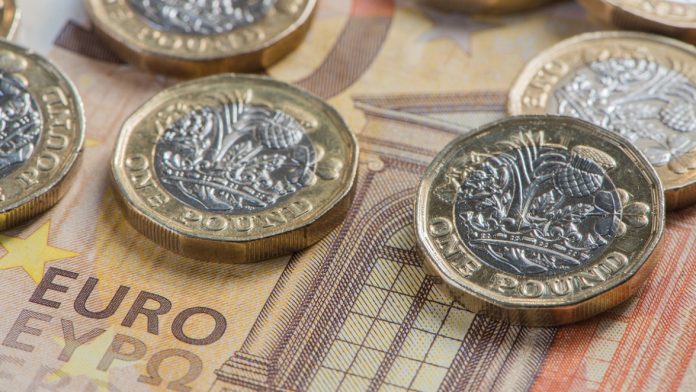After an early decline, the pound rebounded versus the euro on Tuesday. The pound euro exchange rate closed the session 0.15% higher at €1.1020. The pound is advancing in early trade on Wednesday.
| What do these figures mean? |
| When measuring the value of a pair of currencies, one set equals 1 unit and the other shows the current equivalent. As the market moves, the amount will vary from minute to minute.
For example, it could be written: 1 GBP = 1.13990 EUR Here, £1 is equivalent to approximately €1.14. This specifically measures the pound’s worth against the euro. If the euro amount increases in this pairing, it’s positive for the pound . Or, if you were looking at it the other way around: 1 EUR = 0.87271 GBP In this example, €1 is equivalent to approximately £0.87. This measures the euro’s worth versus the British pound. If the sterling number gets larger, it’s good news for the euro. |
UK Prime Minister Boris Johnson came off badly in the Brexit showdown in the House of Commons on Tuesday evening. In a crunch vote, a rebel alliance, which saw 21 Conservative MP’s join forces with Labour and the opposition defeated the Prime Minister. The defeat was by a larger than expected 328 to 301 as the rebel alliance voted to take control of Wednesday’s Parliamentary agenda in a bid to pass legislation to prevent a no deal Brexit.
The Prime Minister’s Brexit strategy is now on the brink of ruin and he is running a dangerously unstable government. Boris Johnson warned that he will never ask the EU for an extension beyond October 31st and instead called for a general election to be held on October 15.
Political uncertainty is never good for a currency. However, in this scenario the pound advanced because yesterday’s outcome means that the UK could be a step closer to avoiding a no deal Brexit. Given the economic damage that economists and business leaders have frequently said that a no deal Brexit will cause, any signs of avoiding a no deal, hard Brexit boosts the pound.
| Why is a “soft” Brexit better for sterling than a “hard” Brexit? |
| A soft Brexit implies anything less than UK’s complete withdrawal from the EU. For example, it could mean the UK retains some form of membership to the European Union single market in exchange for some free movement of people, i.e. immigration. This is considered more positive than a “hard” Brexit, which is a full severance from the EU. The reason “soft” is considered more pound-friendly is because the economic impact would be lower. If there is less negative impact on the economy, foreign investors will continue to invest in the UK. As investment requires local currency, this increased demand for the pound then boosts its value. |
Today there is service sector pmi data which investors could briefly glance at. However, Brexit and political developments will continue to be the principle drivers of the pound.
Euro Under Pressure As ECB Rate Cut Expectations Rise
The euro was broadly flat versus its peers in the previous session. In a quiet day for data investors mulled over dismal data from Germany across the previous week and cheered increased political stability in Italy.
Concerns over the health of the German economy are going nowhere fast. Europe’s largest economy continues to experience a slump in its manufacturing sector which is showing sings of spilling over into the wider economy. The European Central Bank will meet to decode monetary policy for the eurozone next week. Market participants are ricing in an 80% probability that the ECB will cut rates by 20 basis points. This is keeping pressure on the euro.
| Why do interest rate cuts drag on a currency’s value? |
| Interest rates are key to understanding exchange rate movements. Those who have large sums of money to invest want the highest return on their investments. Lower interest rate environments tend to offer lower yields. So, if the interest rate or at least the interest rate expectation of a country is relatively lower compared to another, then foreign investors look to pull their capital out and invest elsewhere. Large corporations and investors sell out of local currency to invest elsewhere. More local currency is available as the demand of that currency declines, dragging the value lower. |
Currencylive.com is a site operated by TransferWise Inc. (“We”, “Us”), a Delaware Corporation.
The content on our site is provided for general information only. It is not intended to amount to advice on which you should rely. You must obtain professional or specialist advice before taking, or retain from, any action on the basis of the content on our site.
Although we make reasonable efforts to update the information on our site, we make no representations, warranties or guarantees, whether express or implied, that the content on our site is accurate, complete or up to date. Some of the content posted on this site has been commissioned by Us, but is the work of independent contractors. These contractors are not employees, workers, agents or partners of TransferWise and they do not hold themselves out as one. The information and content posted by these independent contractors have not been verified or approved by Us. The views expressed by these independent contractors on currencylive.com do not represent our views.





